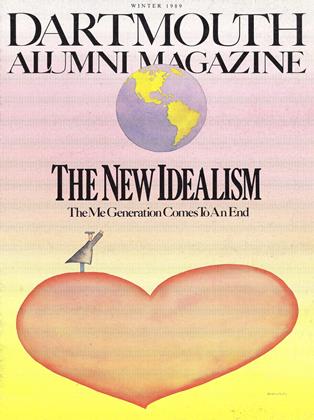1898
A Dartmouth songbook is published. Among the songs is "Come Erlong, Honey," written by Addison F. Andrews '78.
1914
S.R. Walkingstick '18, an Oklahoma Cherokee, creates the original Dartmouth "Indian yell": "Ay-oh-hay! (twice) Ay-oh-wanee-way-hah! Yea-ah! Dartmouth! Dartmouth! Dartmouth!"
1922
The freshman handbook exhorts the new students to catch the Dartmouth spirit by learning the school cheers immediately. The editor adds the warning: "Don't be scared if these cheers look foolish on paper—wait until you hear 2,000 lusty youths get behind them before you make your decision."
1926
The official alma mater is "Song of Dartmouth," at the end of which, for some reason, men are supposed to spell T-I-G-R. President Ernest Martin Hopkins '01 proposes that the song be replaced with "Men of Dartmouth."
1941
A new cheer, titled "Skyrockets," seems to reflect the wartime spirit. A loud whistle is followed by a boom from the drum section, after which fans cry out, "RAH, RAH, RAH, Dartmouth!"
1943
The Outing Club adds a new song to its repertoire: "Seven Old Ladies Locked in a Lavatory."
1949
A group of elderly men from the town enter the annual fraternity Hums contest with a medley of barbershop tunes. The group, called "Twin States Cycling and Oyster Club," is the judges' favorite, but angry fraternity men insist the outsiders get second prize.
1962
Stanley Macomber 'll, writing to the Alumni Magazine, gives his two cents' worth in the never-ending debate over the Alma Mater: "In my era no one rebelled at the idea of granite brains because the terms 'solid ivory,' 'bonehead,' and 'solid granite' had not come into general use."
1966
The Jacko prints an irreverent version of the Alma Mater, including the lines, "For the rich grads who love her; for the dollar sign above her."
1974
Cabin & Trail does the Elis one better with a Dartmouth version of the Whiffenpoof song. "From the tables down at Mory's" becomes "From the tables down at Thayer."
Although over the years a great many songs and cheers have lived and (for some, mercifully) died, one crucial constant remains: the "lusty youths."
 View Full Issue
View Full Issue
More From This Issue
-
 Cover Story
Cover StoryBEYOND ME
December 1989 By Charles Wheelan ’88 -
 Feature
FeaturePutting Words in the Mouths of the Great
December 1989 By Charles Wheelan ’88 -
 Feature
FeatureBob Pack's Quantum Cat
December 1989 By Jay Heinrichs -
 Feature
FeatureSEASON'S GREENING
December 1989 -
 Article
ArticleDr. Wheelock's Journal
December 1989 -
 Sports
SportsThe College's First Fan Picks a Winner
December 1989 By Noel Perrin







